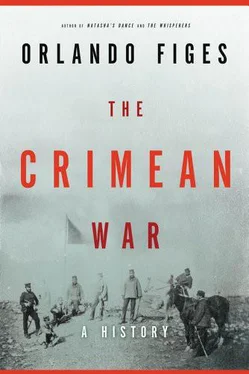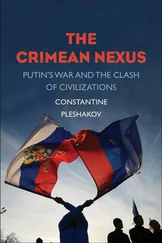There are many books in English on the Crimean War. But this is the first in any language to draw extensively from Russian, French and Ottoman as well as British sources to illuminate the geo-political, cultural and religious factors that shaped the involvement of each major power in the conflict. Because of this concentration on the historical context of the war, readers eager for the fighting to begin will need to be patient in the early chapters (or even skip over them). What I hope emerges from these pages is a new appreciation of the war’s importance as a major turning point in the history of Europe, Russia and the Middle East, the consequences of which are still felt today. There is no room here for the widespread British view that it was a ‘senseless’ and ‘unnecessary’ war – an idea going back to the public’s disappointment with the poorly managed military campaign and its limited achievements at the time – which has since had such a detrimental impact on the historical literature. Long neglected and often ridiculed as a serious subject by scholars, the Crimean War has been left mainly in the hands of British military historians, many of them amateur enthusiasts, who have constantly retold the same stories (the Charge of the Light Brigade, the bungling of the English commanders, Florence Nightingale) with little real discussion of the war’s religious origins, the complex politics of the Eastern Question, Christian-Muslim relations in the Black Sea region, or the influence of European Russophobia, without which it is difficult to grasp the conflict’s true significance.
The Crimean War was a crucial watershed. It broke the old conservative alliance between Russia and the Austrians that had upheld the existing order on the European continent, allowing the emergence of new nation states in Italy, Romania and Germany. It left the Russians with a deep sense of resentment of the West, a feeling of betrayal that the other Christian states had sided with the Turks, and with frustrated ambitions in the Balkans that would continue to destabilize relations between the powers in the 1870s and the crises leading to the outbreak of the First World War. It was the first major European conflict to involve the Turks, if we discount their brief participation in the French Revolutionary and Napoleonic Wars. It opened up the Muslim world of the Ottoman Empire to Western armies and technologies, accelerated its integration into the global capitalist economy, and sparked an Islamic reaction against the West which continues to this day.
Each power entered the Crimean War with its own motives. Nationalism and imperial rivalries combined with religious interests. For the Turks, it was a question of fighting for their crumbling empire in Europe, of defending their imperial sovereignty against Russia’s claims to represent the Orthodox Christians of the Ottoman Empire, and of averting the threat of an Islamic and nationalist revolution in the Turkish capital. The British claimed they went to war to defend the Turks against Russia’s bullying, but in fact they were more concerned to strike a blow against the Russian Empire, which they feared as a rival in Asia, and to use the war to advance their own free-trade and religious interests in the Ottoman Empire. For the Emperor of the French, Napoleon III, the war was an opportunity to restore France to a position of respect and influence abroad, if not to the glory of his uncle’s reign, and perhaps to redraw the map of Europe as a family of liberal nation states along the lines envisaged by Napoleon I – though the influence of the Catholics on his weak regime also pushed him towards war against the Russians on religious grounds. For the British and the French, this was a crusade for the defence of liberty and European civilization against the barbaric and despotic menace of Russia, whose aggressive expansionism represented a real threat, not just to the West but to the whole of Christendom. As for the Tsar, Nicholas I, the man more than anyone responsible for the Crimean War, he was partly driven by inflated pride and arrogance, a result of having been tsar for twenty-seven years, partly by his sense of how a great power such as Russia should behave towards its weaker neighbours, and partly by a gross miscalculation about how the other powers would respond to his actions; but above all he believed that he was fighting a religious war, a crusade, to fulfil Russia’s mission to defend the Christians of the Ottoman Empire. The Tsar vowed to take on the whole world in accordance with what he believed was his holy mission to extend his empire of the Orthodox as far as Constantinople and Jerusalem.
Historians have tended to dismiss the religious motives of the war. Few devote more than a paragraph or two to the dispute in the Holy Land – the rivalry between the Catholics or Latins (backed by France) and the Greeks (supported by Russia) over who should have control of the Church of the Holy Sepulchre in Jerusalem and the Church of the Nativity in Bethlehem – even though it was the starting point (and for the Tsar a sufficient cause) of the Crimean War. Until the religious wars of our own age, it seemed implausible that a petty quarrel over some churchwarden’s keys should entangle the great powers in a major war. In some histories the Holy Lands dispute is used to illustrate the absurd nature of this ‘silly’ and ‘unnecessary war’. In others, it appears as no more than a trigger for the real cause of the war: the struggle of the European powers for influence in the Ottoman Empire. Wars are caused by imperial rivalries, it is argued in these histories, by competition over markets, or by the influence of nationalist opinions at home. While all this is true, it underestimates the importance of religion in the nineteenth century (if the Balkan wars of the 1990s and the rise of militant Islam have taught us anything, it is surely that religion plays a vital role in fuelling wars). All the powers used religion as a means of leverage in the Eastern Question, politics and faith were closely intertwined in this imperial rivalry, and every nation, none more so than Russia, went to war in the belief that God was on its side.
For weeks the pilgrims had been coming to Jerusalem for the Easter festival. They came from every corner of Eastern Europe and the Middle East, from Egypt, Syria, Armenia, Anatolia, the Greek peninsula, but most of all from Russia, travelling by sea to the port of Jaffa where they hired camels or donkeys. By Good Friday, on 10 April 1846, there were 20,000 pilgrims in Jerusalem. They rented any dwelling they could find or slept in family groups beneath the stars. To pay for their long journey nearly all of them had brought some merchandise, a handmade crucifix or ornament, strings of beads or pieces of embroidery, which they sold to European tourists at the holy shrines. The square before the Church of the Holy Sepulchre, the focus of their pilgrimage, was a busy marketplace, with colourful displays of fruit and vegetables competing for space with pilgrims’ wares and the smelly hides of goats and oxen left out in the sun by the tanneries behind the church. Beggars, too, collected here. They frightened strangers into giving alms by threatening to touch them with their leprous hands. Wealthy tourists had to be protected by their Turkish guides, who hit the beggars with heavy sticks to clear a path to the church doors.
In 1846 Easter fell on the same date in the Latin and Greek Orthodox calendars, so the holy shrines were much more crowded than usual, and the mood was very tense. The two religious communities had long been arguing about who should have first right to carry out their Good Friday rituals on the altar of Calvary inside the Church of the Holy Sepulchre, the spot where the cross of Jesus was supposed to have been inserted in the rock. During recent years the rivalry between the Latins and the Greeks had reached such fever pitch that Mehmet Pasha, the Ottoman governor of Jerusalem, had been forced to position soldiers inside and outside the church to preserve order. But even this had not prevented fights from breaking out.
Читать дальше












